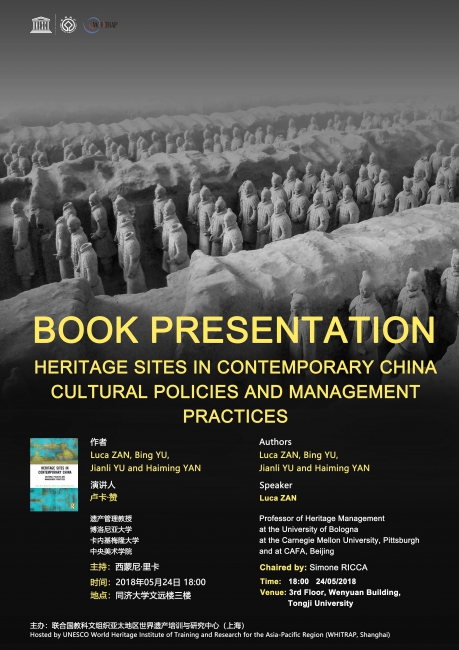| Heritage Sites in Contemporary China , Luca Zan’s Book Presentation |
| Author:Simone Ricca PublishDate:2018-05-24 Hits:2981 |
 On May 24th, 2018, WHITRAP invited Professor Luca ZAN, of the University of Bologna (Italy), to present his latest book: Heritage Sites in Contemporary China: Cultural Policies and Management Practices. Co-written with three Chinese colleagues, Bing YU, Jianli YU and Haiming YAN, the book focuses on the Chinese cultural heritage policies which emerged during the period of the 11th and 12th Five-Year Plans.
Professor ZAN has extensive publications on heritage management, analysis of the impact of archaeological discovery processes, restoration, museum research, and cultural heritage management systems in China and worldwide. Accessing recent Chinese data and plans, his new book provides yet another important contribution to the sector of heritage and management studies.
The book considers heritage as an extension of policy making and aims at filling the gap between the increasing attention and resources the heritage sector is gaining in China — given its explicit use as a tool for both cultural diplomacy and national identity building — and what is actually known about the mechanisms and processes for managing heritage in China.
Through the analysis of a series of case studies, including the ruins of Sui and Tang Dynasties in Luo Yang, the ruins of Daming Palace, Niuheliang, Xinjiang, and Nanyue Palace, five major Chinese archaeological projects are discussed through the dual perspective of archaeological debate and policy-making analysis.
Professor ZAN’s book references a research project on the developmental impact of Great Archaeological Sites (大遗址, Dayizhi in pinyin) which was implemented by the China Academy for Cultural Heritage (CACH) from 2012 to2014. Building upon this research – a broad policy with specific interventions at the project level – the book provides an interdisciplinary insider’s approach to viewing archaeological discoveries, policies and emerging practices in site management, archaeological management, and public administration in China.
The book, divided into three parts, explores the relationship between policy and the institutional and administrative conditions, such as budgeting and land concerns, which affect it. The research is based upon a unique access to data, and, as underlined in the introduction, the volume offers the reader a “journey inside Chinese public administration” in the heritage sector which goes beyond purely theoretical research to propose possible suggestions.
Luca ZAN’s lecture was followed by a public debate which, on the one hand, underlined the risks of Chinese decentralisation, and, on the other, the relatively minor role of archaeologists and conservationists compared to local administrators and architects (whom often lack the basic knowledge in heritage preservation and enhancement) in the safeguarding of major heritage sites throughout China.
Proofreading: Joyce Chen |
- News | WHITRAP Shanghai and CNR-ISPC bilateral meeting
- News | WHITRAP meets Cité de l’Architecture et du Patrimoine
- WHITRAP Hosting "Workshop on Preliminary Assessment for National Focal Points of the Asia Region" in Chengdu
- WHITRAP Shanghai meets UNESCO
- INTERNATIONAL CONFERENCE PRELIMINARY ANNOUNCEMENT & CALL FOR PAPERS
- Observation of the 46th Session of the World Heritage Committee
Copyright © 2009-2012 World Heritage Institute of Training and Research-Asia and Pacific (shanghai)


